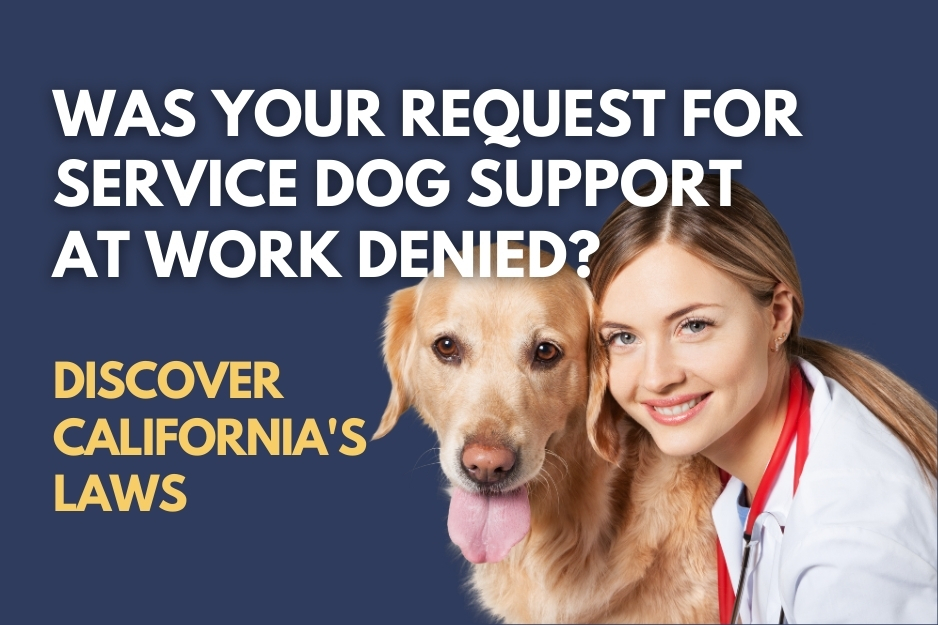
Many people are unaware of the rights and benefits of having a service dog, especially in California. Service dogs at work can provide emotional support and task assistance, helping individuals with disabilities navigate their workplace more effectively.
Specific California laws protect employees who rely on these amazing animals. If you have a service dog for emotional support, know your rights in the workplace. California law explicitly states that employers must allow employees to have their service dogs at work if they are needed for emotional reasons.
However, many employees may not be aware of these protections. Sometimes, employees could face discrimination or even termination if their employer refuses to accommodate their service dog.

Service Animal vs. Emotional Support Animal: What’s the Difference?
A service animal and an emotional support animal serve different roles for people with disabilities. Knowing their legal distinctions is essential, as other rules may apply to your situation.
A service animal is a dog or miniature horse trained to assist a disabled person. Only these two animals qualify as service animals. They must be specifically trained to perform tasks related to the individual’s disability.
While in training, they aren’t officially considered service animals, but you can take them to public places in California for training purposes. If a service animal in training causes damage, you may be legally responsible for covering the costs.
An Emotional Support Animal (ESA) is any animal that offers comfort or support to help ease the symptoms of a person’s disability.
Unlike service animals, ESAs don’t require special training. However, they do not have the same rights to public access as service animals, meaning they can be denied business entry.
It’s illegal to falsely claim an ESA as a service animal, which can lead to six months in jail and/or a fine of up to $1,000, according to Penal Code Section 365.7(a).
What are California’s laws regarding service dogs in the workplace?
Under the Americans with Disabilities Act (ADA), service animals are not limited to guide dogs for blind individuals.
Service animals can also include emotional support animals that provide comfort and assistance to individuals with emotional disabilities.
In California specifically, the Fair Employment and Housing Act (FEHA) protects employees with disabilities, including those who require a service animal for emotional support.
Know your rights if you have a service dog for emotional reasons and your employer tells you you cannot bring them to work.
Under California law, employers must make reasonable accommodations for employees with disabilities. That includes allowing them to have their service animal present in the workplace.
Has your employer refused to accommodate your service dog without valid reasons related to business necessity or undue hardship? If so, they may be in violation of the law.

The Role of Service Dogs in Disability Accommodation
Someone might have a service dog at work to assist with tasks related to their disability.
For example, individuals with mobility impairments may need help opening doors, retrieving items, or navigating crowded spaces.
A service dog can be trained to perform these tasks and more, making it easier for their handler to complete their duties effectively.
Service dogs are highly trained professionals who undergo rigorous training to perform tasks tailored to their handler’s needs.
Employers and coworkers need to know that service dogs are working animals. People should not distract or approach them without permission.
By respecting the space of the service dog and its handler, everyone can help create a safe workplace which is better for all employees.
Under California law, employers must make reasonable accommodations for employees with disabilities. This includes allowing them to bring their service dog to work.
If this right is violated, hire a service animal lawyer to protect your rights.

Service dogs at work to assist with a visual impairment
In addition to emotional support and task assistance, service dogs can help individuals with disabilities navigate their workplace more effectively.
A person who is blind or visually impaired may rely on their service dog for many tasks. A specially trained service dog will guide them safely through the office building or alert them to potential environmental hazards.
These specially trained dogs can guide their handler around obstacles, alert them to changes in elevation, and help them locate specific rooms or areas within the workplace.
Service dogs are trained to perform specific tasks that can enhance an individual’s productivity and independence at work.
Employers in California must be aware of the rights of employees who rely on service dogs in the workplace.
Under the Americans with Disabilities Act (ADA), employers must make reasonable accommodations for employees with disabilities, including allowing them to bring their service dog to work.
This may include modifying workspace layouts, providing designated rest areas for service dogs, or allowing time for necessary breaks for both the employee and their dog.
Feeling Stressed? Discover the Benefits of a Workplace Service Dog
One of the main reasons why someone might choose to have an ESA animal at work is for emotional support. Many people experience anxiety, depression, or other mental health issues. These problems can make it challenging to manage the stress of a typical workday.
Having an emotional support dog at work can reduce stress levels. Interacting with a friendly and comforting animal can help lower cortisol levels and promote a sense of calmness and relaxation.
This can be especially helpful in high-pressure work environments with high stress levels. Many organizations handle support animal registration.
Assistance animals can help with post-traumatic stress disorder and various medical conditions. They can work or perform tasks and are individually trained for major life activities.
An emotional service animal can provide comfort, companionship, and security, which can help its handler feel more at ease in the workplace.
In California, employees have rights under the Americans with Disabilities Act (ADA). This law lets them bring their service dog to work if they meet specific requirements.
Rights and Responsibilities for Employees with Service Dogs
Employees with service dogs need to communicate openly with their employers about their needs. They should communicate how their service animal helps them perform essential job functions.
Employers are obligated under the law to interact with employees who request accommodations for their disabilities. This can include discussing possible solutions, such as allowing the service dog at work.
If an employer fails to engage in this process or unreasonably denies an accommodation request, they may be liable for discrimination.
Having a service dog at work can improve overall morale and productivity.
Studies have shown that pets in the workplace can reduce stress levels, increase employee satisfaction, and create a more positive work environment.
By allowing employees to bring their service dogs to work in California, employers can show that they value diversity and inclusion in the workplace.
What steps you can take if you feel your rights have been violated?
Employees who feel discriminated against or wrongfully terminated because they need a service dog at work have legal options.
Employees can file a complaint with the Department of Fair Employment and Housing (DFEH).
They can also seek legal representation to pursue a wrongful termination claim or a discrimination claim against their employer.
As a California employee, you do not have to tolerate discrimination or wrongful actions by your employer. Take action to protect your rights if you feel they were violated.
Contact RD Law Group if your employer has discriminated against you or wrongfully terminated you because of your service dog. One of our wrongful termination lawyers can explain your rights.
Call 424-535-1500 for a 100% free case evaluation. A California discrimination lawyer will listen to what happened and let you know if we can help.
If we take your case, you pay nothing upfront. We don’t get paid until after we settle your case. If there is no settlement, there are no legal fees due.
Everyone deserves equal treatment in the workplace and should not be subjected to unfair treatment. If you have a disability that requires a service animal, and your rights have been violated, we will seek justice for you.
Disability Discrimination Claims – Wrongful Termination Claims – California Employment Lawyers
Los Angeles Employment Law Firm – Los Angeles Employment Attorney – Employee Rights Law



